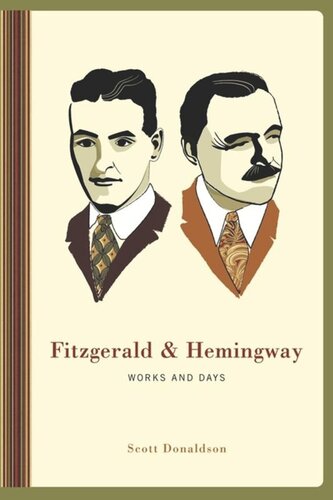

Most ebook files are in PDF format, so you can easily read them using various software such as Foxit Reader or directly on the Google Chrome browser.
Some ebook files are released by publishers in other formats such as .awz, .mobi, .epub, .fb2, etc. You may need to install specific software to read these formats on mobile/PC, such as Calibre.
Please read the tutorial at this link: https://ebookbell.com/faq
We offer FREE conversion to the popular formats you request; however, this may take some time. Therefore, right after payment, please email us, and we will try to provide the service as quickly as possible.
For some exceptional file formats or broken links (if any), please refrain from opening any disputes. Instead, email us first, and we will try to assist within a maximum of 6 hours.
EbookBell Team

4.7
106 reviewsF. Scott Fitzgerald and Ernest Hemingway might have been contemporaries, but our understanding of their work often rests on their distinctions. Hemingway wrestled with war, fraternity, and the violence of nature. Fitzgerald explored money and class and the pursuit of the elusive golden girl. Known for his penetrating studies of both authors, Scott Donaldson traces their creative genius, and through his provocative arguments, their affinities become as clear as their differences. Fitzgerald and Hemingway both wrote fiction out of their experiences rather than about them, leading Donaldson to pursue both biography and criticism in these essays. With a deep commitment to close reading, he traces the influence of celebrity culture on the legacies of both writers, matches an analysis of Hemingway's Spanish Civil War writings to a treatment of Fitzgerald's left-leaning tendencies, and contrasts the averted gaze in Hemingway's fiction with the role of possessions in The Great Gatsby. Donaldson devotes several essays to four great novels: Gatsby, Tender Is the Night, The Sun Also Rises, and A Farewell to Arms. He also includes fascinating accounts of Fitzgerald's formative years in St. Paul, his romance with the American South, and his days in Hollywood, as well as Hemingway's apprenticeship as a newspaperman, extraordinary fame, and suicide. Based on years of research and brimming with Donaldson's trademark wit and insight, this irresistible book reorients our reading of twentieth-century American literature.
F. Scott Fitzgerald and Ernest Hemingway might have been contemporaries, but our understanding of their work often rests on simple differences. Hemingway wrestled with war, fraternity, and the violence of nature. Fitzgerald satirized money and class and the never-ending pursuit of a material tomorrow. Through the provocative arguments of Scott Donaldson, however, the affinities between these two authors become brilliantly clear. The result is a reorientation of how we read twentieth-century American literature.
Known for his penetrating studies of Fitzgerald and Hemingway, Donaldson traces the creative genius of these authors and the surprising overlaps among their works. Fitzgerald and Hemingway both wrote fiction out of their experiences rather than about them. Therefore Donaldson pursues both biography and criticism in these essays, with a deep commitment to close reading. He traces the influence of celebrity culture on the legacies of both writers, matches an analysis of Hemingway's Spanish Civil War writings to a treatment of Fitzgerald's left-leaning tendencies, and contrasts the averted gaze in Hemingway's fiction with the role of possessions in The Great Gatsby. He devotes several essays to four novels, Gatsby, Tender Is the Night, The Sun Also Rises, and A Farewell to Arms, and others to lesser-known short stories. Based on years of research in the Fitzgerald and Hemingway archives and brimming with Donaldson's trademark wit and insight, this irresistible anthology moves the study of American literature in bold new directions.